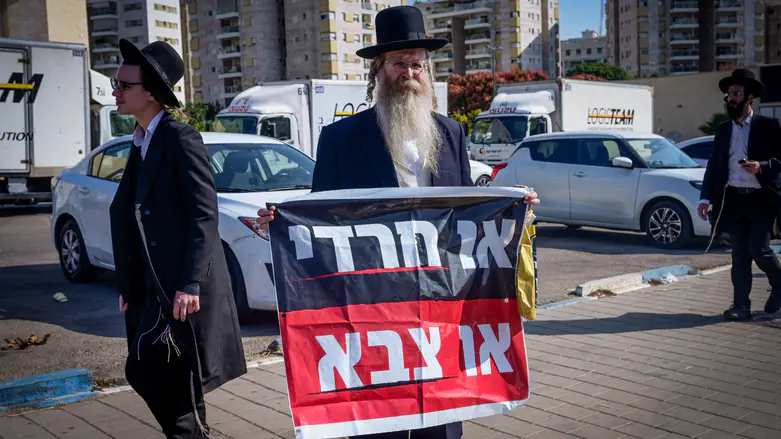Meir Yona, a student at Yeshiva B’er Yehuda in Jerusalem, was released from military prison on Saturday night after spending the weekend in custody. He was arrested on Friday during a routine traffic stop and subsequently detained by the military police on charges of desertion from military service.
Following his arrest, hundreds of Hasidic worshippers gathered outside Military Prison 10 to await his release. The crowd erupted in singing and dancing upon his arrival.
Describing his experience, Yona said: “After I showed the policeman my ID, he told me, ‘You’re a draft dodger, you’re going to jail.’ I said, ‘Why jail? I’m a yeshiva student.’ The military police arrived, handcuffed me, and took me to a cell with no air conditioning or water. It was hard, but I will stay strong.”
His arrest has intensified ongoing tensions between the haredi community and the military over enforcement of conscription laws. In recent nights, protests have been held outside the prison, with large crowds objecting to the detention of yeshiva students who have not enlisted.
Amid the unrest, senior rabbis have taken firm positions. In his weekly Torah lecture, Rabbi Yitzchak Yosef sharply criticized Rabbi David Leibel for promoting military service among yeshiva students. Referring to a conversation between Rabbi Yitzchak Eichenstein, head of Yeshivat Yad Aharon, and Rabbi Leibel, Rabbi Yosef said: “Rabbi Eichenstein tried for four hours to convince him that the main thing is Torah.” He went on to caution, “Most of his students are Sephardim. He seduces them. We must be careful not to listen to him.”
Rabbi Leibel, who leads Yeshivas Mishmeres Torah and the Achvat Torah network, is known for advocating both Torah study and national service, a view not shared by many in the haredi mainstream.
Separately, Rabbi Bonim Schreiber, head of a Jerusalem yeshiva and rabbi of the Bnei Pinchas community in Ashdod, addressed the controversy at a weekend gathering of yeshiva students. He framed the growing divide between the Torah world and broader Israeli society as a positive development.
“They say the yeshiva boys are being persecuted by the authorities, and we are all afraid,” Rabbi Schreiber said. “But this situation has clarified that we are two separate worlds. There is the world of Torah, and there is another side — even if they wear a kippah, we have no connection with them.”
He echoed views attributed to the Brisker Rav, claiming that the establishment of the State of Israel was designed “to persecute Judaism,” adding: “Now we see it clearly. And if society hates yeshiva students — Baruch Hashem, that’s a good thing.”
Rabbi Schreiber also addressed government restrictions, including a ban on yeshiva students traveling abroad, saying it could strengthen commitment to Torah study: “It’s the best thing that could have happened. These decrees are from Heaven — to remind us to learn Torah because we want to, not just because it’s what everyone does.”
He acknowledged the economic hardships facing many religious families but insisted that financial pressure was part of the spiritual test. “They may take everything from you, and still, you will sit and learn,” he said.
In closing, he suggested the current crisis could mark a turning point: “We’ve become too connected to the outside world. God is saying: ‘Enough — disconnect and return to who you are.’ Thank God we’ve reached this moment.”

